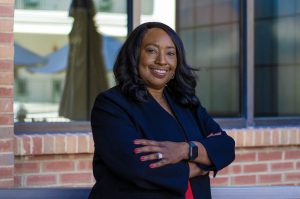
Photo by Ashton Summers.
Nearly 60 years after integration, the University of Mississippi is still acknowledging firsts and the example set by those individuals who are the first.
Ethel Young Scurlock is the first Black woman to become dean of the Sally McDonnell Barksdale Honors College. Although she’s starting a new journey by taking on this position, she has been a part of this community for more than a decade.
After growing up in the Memphis area, Scurlock enrolled at the University of Tennessee in Knoxville when she was 17.
“I went to Knoxville for four years and was in Ohio for six years. I wanted to come back to the South and landed in Mississippi. I was excited because I was closer to home again,” Scurlock said.
Scurlock’s transition to the university in 1996 wasn’t difficult, however, the transition from professor to dean this year wasn’t exactly a walk in the park.
“It’s been a very demanding transition, and it makes me look at the honors college in new ways. I was teaching Honors 101 and 102 off and on for about 16 years, and you get that view of meeting the students as they come in as freshmen and engaging with their intellectual journey, following them all the way through graduation as they’re matriculating throughout the university,” she said. “But stepping into the dean’s position makes you have to have a birds-eye view of the curriculum, think about recruiting, development of fundraising and creating programming that energizes our students.”
The class of 2026 is the second largest class within the honors college and has the largest percentage of African American students ever, with 6.68%.
“There are 31 out of 464 students that are African American in the class of 2026 honors college. I want to see it grow. I want us to move towards being more reflective of the nature of our university,” Scurlock said.
The University of Mississippi student body is 12.7% African American, according to statistics from the 2021-2022 school year.
“I’m just trying to work and labor every day. I’m honored, and I’m very grateful. I think about my early years in the honors college, being the only Black person in classrooms,” Scurlock said, reflecting on being an example for students of color. “The first time I came back to honors and taught my first 101 class, I was the only black person in the room, and I had forgotten what that felt like. I went to the University of Tennessee, Knoxville which was only 6% African American.”
Scurlock paraphrased a quote from author Brené Brown: “Belonging does not mean that you can go somewhere and fit in, that real belonging is that you feel free to show up as your full self and that you’re not made invisible.”
Creating a space for students of color in the honors college to feel comfortable was and still is very important to Scurlock.
“I want students from all backgrounds to feel a sense of belonging when they come to the honors college,” Scurlock said. “I want them to feel comfortable showing up as their true selves. To now say we have a more diverse student body and curriculum, it’s really meaningful.”
Setting this stamp in history has filled Scurlock with immense gratitude.
“I think it’s so important that we acknowledge those who’ve gone before us,” Scurlock said. “I am so thankful for those female and African-American professors that came and set the path before me. I’m not here because of who I am, but because of who they are.”


























